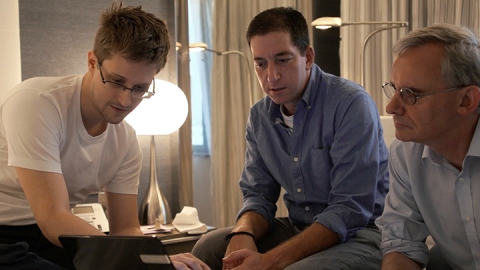"Citizenfour" for Women's March
by Grace Oeth
On March 7th, Iowa City’s local theater, Filmscene, had a matinee showing of Laura Poitras’s “Citizenfour.” This critically-acclaimed documentary was released in 2014 and details the meetings between Poitras, journalist Glenn Greenwald, and Edward Snowden—who in the documentary said his friends call him “Ed.”
Poster of “Citizenfour” featuring Edward Snowden. Courtesy of HBO Films, Participant Media, and Praxis Films.
This film was chosen by one of the University of Iowa’s Documentary Studies classes to be shown as a feature for FilmScene’s Women’s March, a month-long program in March dedicated to highlighting women in film. FilmScene’s slogan for their campaign is “Women, every day, every film, all March.” Since “Citizenfour” focuses primarily on Snowden, a man, there are few women featured in the film.
I interviewed Marissa Still, a student in the Documentary Studies class responsible for choosing the film. She was gracious enough to sit down with me to chat about the movie.
Filmscene’s logo for their Women’s March series. Their mantra being, “Women, every day, every film, all March.” Courtesy of FIlmscene.
Sill explained that the main objectives of her class are to learn about theories pertaining to documentaries, and hold weekly screenings of films to further their discussion. In relation to “Citizenfour,” Sill described the selection process compared to other films the class was considering. “Initially,” she started, “Hannah [Bonner—the class’s instructor] told us that there were three films. There was “Black Panthers” (2015), “Stories We Tell” (2012), and then “Citizenfour”...and [we] had an anonymous voting for the movie we wanted.” Sill’s class section decided on Poitras’s film and the other class decided to screen “Stories We Tell”, which is about a woman’s exploration into family story-telling, using her mother as the focus. The showing for this film is on March 28th at 3:30pm, also at Filmscene.
“We were just kind of focusing more on female directors,” Sill continued. “I honestly don’t even know if I had seen a [documentary] film by a female director before I saw these ones, so I think that’s what the showing is mainly about.” I asked why they chose “Citizenfour” to appear in the Women’s March series, due to the lack of women represented in the film. Sill responded saying that Poitras’s involvement in “Citizenfour” is more relevant than one may imagine. “The director was contacted by Edward Snowden and it pretty much changed her whole life...She had to go to Hong Kong and she was also [wanted] by the police because she was making this documentary—like Snowden.” Sill also mentioned Poitras’s other works preceding “Citizenfour,” including “The Oath” (2010) and “My Country, My Country” (2006). These films detail the U.S.’s involvement in the Iraq War, and landed Poitras on the Department of Homeland Security’s watch list. Sill reinstated that the reason why her class picked Poitras’s film was because her background brought complexity to the story.
After the showing of “Citizenfour,” Nellie Kluz, Michael Wawzenek, and Alex Denison were invited by the class to hold a discussion panel pertaining to the movie. Each panelist had experience working in or with documentary film, and all gave insight to Poitras’s work. The topic of including herself in the film—or lack thereof—frequently came up. Rather than explicitly showing herself all the time, there are other ways that Poitras chose to represent herself as a character in the story. She uses her voice to narrate emails received from Snowden, but then shows the audience text whenever her own words are needed to propel the plot forward. Kluz noted, “She adds so much—not necessarily with her gender but with her intelligence. And there’s a sense that there is still a subjective person in the space,” which compliments Kluz’s previous comment about how everyone in the documentary seems to be data hungry.
Still from Laura Poitras’s “Citizenfour” (2014). From left to right, Edward Snowden, Glenn Greenwald, and reporter Ewen MacAskell, all surrounded around a computer containing the leaked NSA files. Courtesy of HBO Films, Participant Media, and Praxis Films.
Wawzenek jumped in and also expressed his interest in considering her a character, more in a visual context; “[Poitras] is revealing the apparatus of film and moving-image making, just like Edward Snowden is revealing all of these big details about surveillance...Her refusal to mask herself—her own kind of identity—just shows that it was a part of the process...For this to be a successful documentary, which I think it is, it had to have her as a character, in a sense. That’s how I see [Poitras] functioning in the film.” Denison then related a similar notion, but claimed that not seeing her all the time, and understanding how present she was during the tense situations, humanized the movie. She gave the audience more perspective.
“Citizenfour” is a fantastic film, giving its audience a deep dive into the world of surveillance both in a surreal and objective way. Despite my initial hesitation as to why this film was chosen to be included in a series specific to women, the importance of Poitras’s involvement in the film proves its validity. Her passion for truth and honesty in her work shows that this film is a testament to the power of a woman on a warpath.




